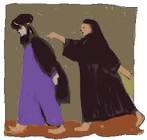
Jesus spoke many times about prayer and the disciples often saw him withdraw to pray in a quiet place. He wanted to give them a new picture of his Father, so that they might be able to relate to him as they would to a loving parent. Today’s parable emphasises persistence in prayer. Widows were very vulnerable in the society of the time, because - without a man to support them - they were usually penniless, like the widow who put her entire livelihood into the treasury in the form of two small coins (Luke 21:1-4). In both the Old and New Testaments there were strict directives to protect the widow; Deuteronomy (10:17-21) and James (1:27) provide just two examples. The judge therefore was going against the law that he was supposed to uphold. The widow who confronted him was quite clear what she wanted and intended to get it. The original word, translated as “pestering”, was far stronger and meant “giving a black eye” or “punching”. The judge gave in to her because not only would he get no peace or come to physical harm but he would be made a show of as well.
Jesus often used hyperbole and stark contrasts to drive his point home. If a man like the judge could be persuaded to attend to the widow’s plea, how much more would a loving father listen to the prayer of his children? “When the Son of Man comes, will he find any faith on earth?” - There is a poignancy about this line. Jesus is making his way to Jerusalem, where he himself will face gross injustice and be put to death. Did he wonder about how many believers there would be at his Second Coming who remembered his sacrifice? “Those who wait hopefully for me will not be ashamed” (Isaiah 49:23).